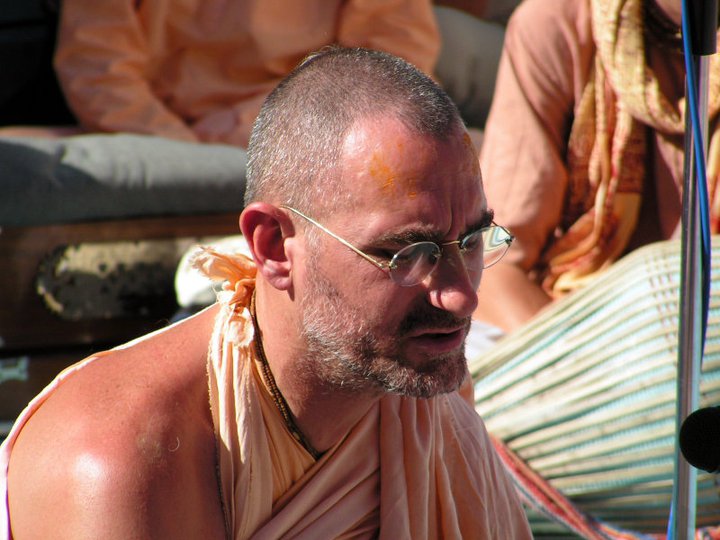
Until one completely purifies the heart, there is always danger of falling down. Therefore, if we are always meek and humble and always dependent upon Krishna, follow these symptoms of surrender, then Kṛṣṇa can protect us. But if we are proud, proud means then we are proud of our own abilities. And that means, to that degree we are proud, to that degree we are on our own. Then if we are saying that 'I can do this,' we are not recognizing, 'No, it is Kṛṣṇa who is doing this.' So then that pride may get us into trouble because pride has a tendency to grow. And then after a while we think we can do everything. And then it is 'Yes, okay, go for it!' So it is very... One has to be very, very careful. That's why so much emphasis is put on that verse, tṛṇād api sunīcena, is that one must be meek and humble and respect others, have all respect for others, expect none for himself. Then you can chant all the time.
Do you want justice or do you want to go back to Godhead?
So these things are difficult, especially when they become clouded by the cause of justice, material justice. Then it is like 'I have been wronged.' Yes, okay, we have been wronged. But then who did you wrong in a previous life?' 'No, but I am not wronging now and I am a devotee.' Okay, great. So do you want justice or do you want to go back to Godhead? So which is higher? Going back to Godhead or fighting for the cause of justice? And of course, 'But we don't want this to happen to any other devotee.' Great. But now, what is the method you are going to go about it? You are going to use the method that you are fighting against to get it? Right? People are behaving badly, so, therefore, you will behave badly to correct it? It doesn't really work like that. One has to act according to religious principles to correct it. And the most important religious principle is Kṛṣṇa consciousness. So one has to deal with it with maturity, but that means realization and that means faith, that means commitment to the devotional process. So that means, we have to put out ourself. While the other one, we don't, it's cheap. 'I can get justice today, no matter if I am qualified or not.'
Not that the culture shouldn't be in place, but we have to understand what are the different levels of that culture. And if you are endeavoring for a higher level, then the lower will come, but you have to actually know what those levels are. You have to know what you are endeavoring for. We are saying, 'Oh, we just chant Hare Kṛṣṇa, we don't care for all this.' Okay, if we don't care for all this, it means we don't care for justice either. If we care for justice, then along with justice there is so many technical rules. Now, what are those technical rules? Right? I mean, good and bad didn't come from the contemporary culture, good and bad is established by God. So, therefore, what does God have to say about these activities? That is the problem, is then it puts us back in the position of being subservient. So that is the whole difficulty.
If we have used unjust means to get our justice, in the future it will go the other way.
We just have to choose what we want. The choice is ours. That is the thing. We want justice, then we have to wait around to get it. And if we have used unjust means to get our justice, that means in the future it will go the other way. You know, like that very, very well thought out... There is that painting where you have the cow with the human head and then the human with the cow's head - that is justice. That painting is justice, that is material justice. That's it. You want it, you got to wait around for it. Maybe you get it now. But how did you get your justice? So if there was anything unjust about how you got your justice... You may say the means justifies the ends. That's all right. That is us saying. But what does God have to say about it? He is running the show, not us. So now, if there was anything unjust in how we got our justice, then the other person, that same soul, is going to get the opportunity to get back on us. And then we are going to say again, 'I was unjustly dealt with.' And it just keeps going on and on, and on and on and on, birth after birth, after birth after birth, right? The human kills the cow, then the next life the cow is a human, the human, it's the cow, right? Then he has the opportunity to kill that human who is now in the cow body. If he does it, he has got justice. But now because he has killed a cow, now that living entity who is the cow, who was the human before, will become the human and they will become the cow. And if they take advantage of that, then again, it will just go on unlimitedly, until one day the human who was the cow, or whatever, we could go on 'who was the human who was the cow...' [Laughter] Then if they decide, 'What am I doing? This is nonsense. You can't kill these cows,' then that stops. But then justice wasn't obtained, right?
One day you just have got to turn around and walk out on it and not look back.
So that is the whole thing. There is no solution in this material world. The only way is to get out. That's it. And so, that means at one point we must detach ourself and not care and turn our back on it. That's it. It's not that you will wrap everything up and get everything perfect and all that, and when everything is just like, you know, picture perfect, then I will just in a very wonderful way, after saying goodbye to everybody and having a big party, then I will walk off into the sunset and go back to Godhead. It won't work like that. It's just one day you just have got to turn around and walk out on it, finished, that's it, and not look back. Otherwise then, just if we look a little bit, Māyā will get us there. You have to remember that principle. How does the boy and girl, how do they catch each other's attention? By a straight glance or out of the corner of the eye? So that's the way it is. You just turn with a little glance at Māyā, and that's it.
So one has to just leave it. There is no nice way of saying goodbye, that is the problem. We want it to be a nice way, but it doesn't exist. That's why Kṛṣṇa uses the analogy of the sword: it's just you have to cut it off. That's it, finished.

